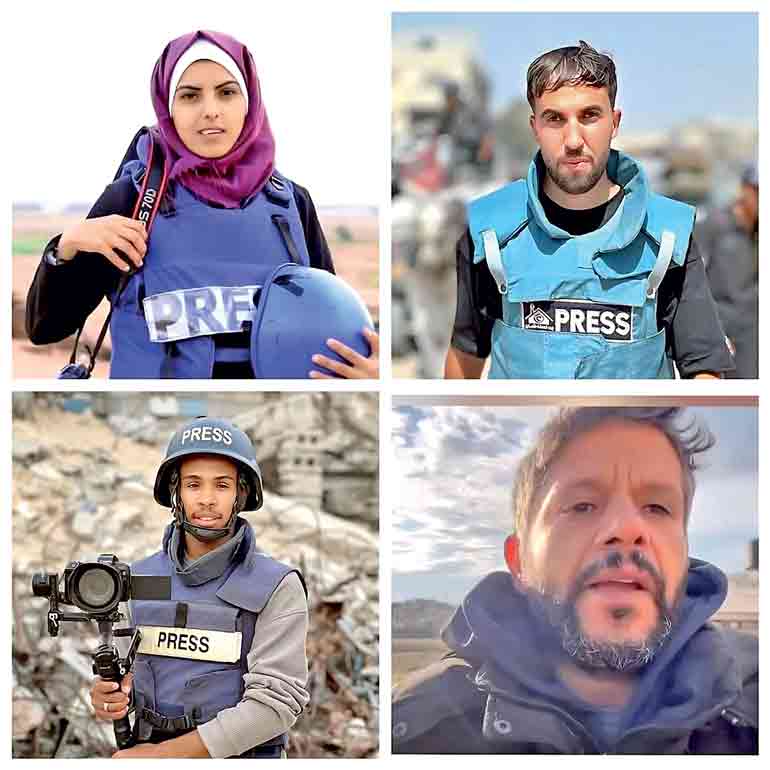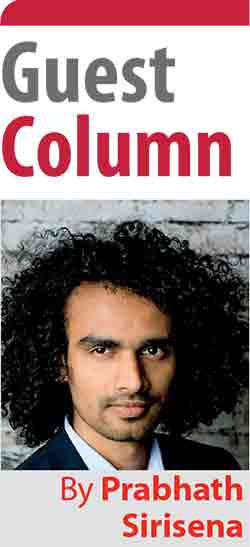Thursday Feb 19, 2026
Thursday Feb 19, 2026
Thursday, 28 August 2025 02:19 - - {{hitsCtrl.values.hits}}

Palestinian journalists
A bomb has been dropped on the Nasser Hospital in Khan Younis, Gaza. Someone is videoing from a distance, and we see Palestinian aid workers climbing up the stairs, trying to rescue the survivors. Among the civil defence crew wearing bright vests, there are also four journalists: Hossam al-Masri (Reuters), Mohammed Salama (Al Jazeera), Mariam Abu Daqqa (Independent Arabia) and Moaz Abu Taha (NBC). Then another explosion, killing those very people offering help and documenting the carnage. In front of cameras, for the whole world to see through the livestream, Israel commits yet another war crime and … nothing happens.
At this point one has to step back in awe at the sheer audacity of it, the impunity with which Israel continues to decimate hundreds of thousands of Palestinian lives. Equally impressive—though perhaps it shouldn’t come as much of a surprise—is the nonchalance with which all that destruction is dismissed, not just by those in power but, as I’m beginning to understand, large swaths of the Western populace.
 Past atrocities, present reality
Past atrocities, present reality
After living for years in the former home of a Jewish family in Amsterdam who got killed by the Nazis, I feel the irony acutely. When six million Jews (along with a million Roma, Sinti and other people) were murdered by Nazi Germany, the West (along with many others, including millions of men and women from the colonies who fought alongside the British in WWII) managed to liberate the remaining prisoners, and declared, “never again.” What little credibility this statement had managed to retain in the ensuing years have finally been obliterated by the genocide in Gaza. “Never again” is now, at best, a hollow platitude. At worst—and this is probably closer to the truth—it stands for selective compassion. Never again, yes, but only for chosen people.
In this, Israel and the West are only continuing a time-honoured practice of the empire. There’s an exchange rate for the value of human lives based on the accident of birth. Some lives are only worth acknowledging long after the fact, in the footnotes of history: more than a hundred million indigenous people in the Americas to make room for the colonisers; a ten million in Congo to fill the coffers of King Leopold; an estimated hundred million in India during the British raj.
Perhaps the mistake is ours, to be surprised at the recurrence of such atrocities in our own times. Perhaps we were delusional to not see that genocide comes with its own perverse pleasures that are irresistible. Times change, but our depraved desires endure.
Execution and denial
The most despicable pleasure of genocide is, obviously, in its blood-thirsty execution. This is reserved for the sniper pulling the trigger, a drone operator releasing a bomb, a gunner firing tank shells, and then gleefully sharing their spoils online for all to see (which, incredibly, is something that happens).
Only one degree separated from that is the pleasure of those who see this as some geopolitical strategy game devoid of actual human affect. Tetris for tyrants. They make important decisions, fund it, supply arms, and control the media narrative: the politicians, the lobbyists, the complicit media, and the billionaire class that own the military-industrial complex (which includes brands that we are intimately familiar with).
Somewhat more refined are the tastes of those for whom a genocide is a sadly complex issue that they cannot wrap their head around. How unfortunate, they say, that this has to be done, but there is no alternative. This pleasure of wallowing in pseudo-complexity is reserved for those who are positioned far enough from the carnage (not just geographically but also socioeconomically) to be insulated from any meaningful impact. It came as a shock for me to see people in my own extended network almost cheering this massacre from the sidelines, not the least among them a prominent scholar of Buddhist studies(!) based in the Netherlands whose works I have cited in the past.
A different type of pleasure is that of denial, available to those who can conveniently ignore the genocide that is partly funded by their own tax money. The EU is the largest investor in Israel, and the Netherlands is the largest investor of all EU states. For some members of Dutch society, however, this is all stuff happening in that dusty part of the world inhabited by a different kind of human who is prone to spontaneous combustion. We have some of that type in Sri Lanka too. Blessed are they to be able to be blind to such bloodshed.
The poetry of genocide
And finally, there is the perverse pleasure I myself have discovered since the escalation of atrocities in the past two years: the beauty and depth of Palestinian writing. I’m sure I’d have encountered the works of Ghassan Kanafani (RIP), Susan Abulhawa, Refaat Alareer (RIP), Mohammed El-Kurd, Mosab Abu Toha, and Sarah Aziza even in the most peaceful of times, for such is the power of their prose and poetry, but the genocide has certainly expedited the process of discovery. When enraged by the deadly livestream, I seek refuge in their words.
Beating the fog of dehumanisation, the words of these brave Palestinians shine through, breaking the barriers of our hearts. Like the coward that I am, whose resistance is limited to beating the odd pot at a protest and donating to those who are doing the actual hard work, I gobble them up. Like this poem of Mosab Abu Toha, from his collection “Forest of Noise.”
For a Moment
Her small body rides in my arms
as I run to the hospital.
There is no electricity
and the inner hallways are
a forest lined with cots.
The girl I carry
is dead,
I know that.
The pressure of the explosion
tore apart her thin veins.
I know she is dead,
but everyone who sees us
runs after us.
You are alive
for a moment,
when living people
run after you.